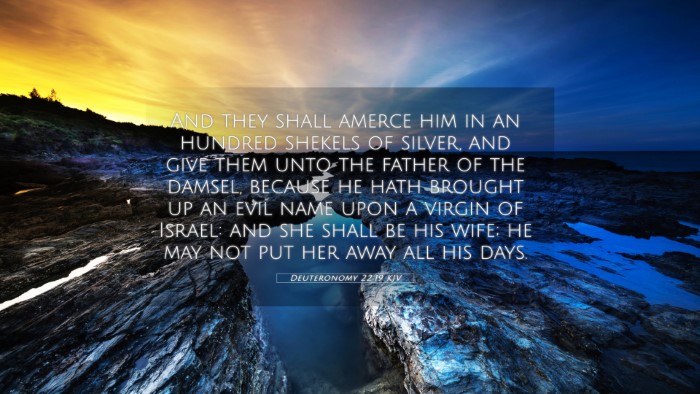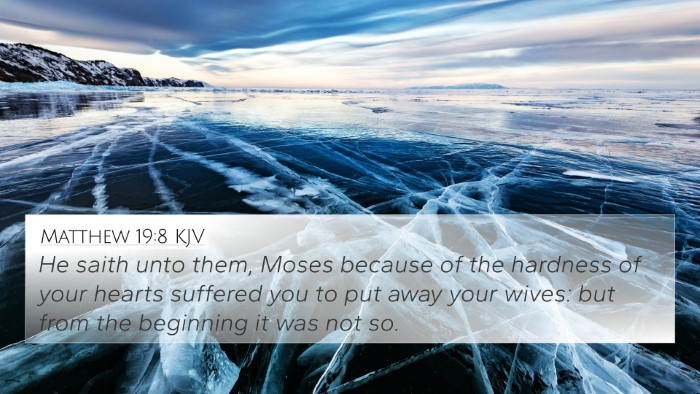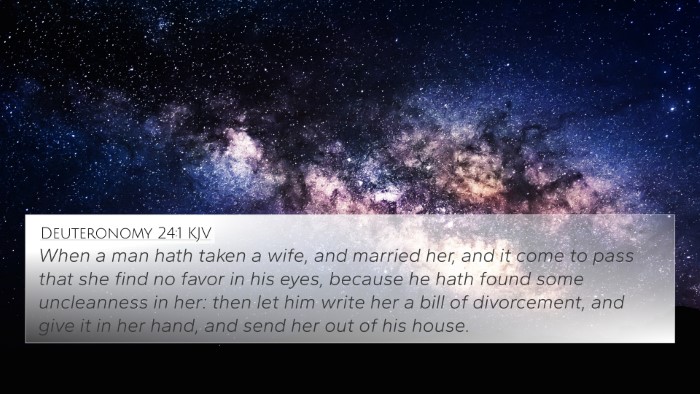Deuteronomy 22:19 Meaning and Interpretation
Deuteronomy 22:19 states, "And they shall amerce him in an hundred shekels of silver, and give them unto the father of the damsel, because he hath brought up an evil name upon a virgin of Israel: and she shall be his wife; he may not put her away all his days." This verse addresses the legal stipulations concerning a man who falsely accuses a woman of not being a virgin at the time of marriage. The implications of this verse are significant in terms of social justice and community ethics.
Summary of Insights from Commentaries:
-
Matthew Henry:
Henry emphasizes the importance of maintaining integrity within the community. The accusation of a lack of virginity not only affects the reputation of the woman but also the honor of her family. Such accusations carry serious consequences, and the law aims to deter men from making baseless claims by imposing fines.
-
Albert Barnes:
Barnes discusses the financial implications of the man’s actions. The hundred shekels serve as a compensation not just for the shame inflicted but also as a deterrent against future false accusations. The expectation that the man must marry the woman signifies a restoration of her dignity and ensures responsibility for his actions.
-
Adam Clarke:
Clarke notes that this law serves to protect women from unjust treatment and reinforces the idea of commitment. By marrying the woman, the man demonstrates accountability and respect. It also upholds the sanctity of marriage and the importance of fidelity, which is a theme prevalent throughout the Biblical narrative.
Thematic Connections and Cross-References:
- Exodus 22:16-17: Discusses similar issues regarding seduction and the responsibilities of a man towards a woman he has wronged.
- Deuteronomy 22:13-21: Addresses accusations concerning a woman's virginity and the repercussions for false claims.
- 1 Timothy 5:19-20: Provides insight into handling accusations within the church community, emphasizing the need for evidence and proper procedure.
- Proverbs 11:13: Highlights the importance of keeping confidences and the dangers of gossip, which relate to the broader implications of public accusations.
- Numbers 5:11-31: Introduces the test for an unfaithful wife, illustrating how serious accusations are treated in Biblical law.
- Matthew 5:27-28: Jesus reinforces the moral principles of fidelity and the seriousness of sexual sin, connecting to the themes of this verse.
- Hebrews 13:4: Upholds the honor of marriage and the importance of sexual purity, resonating with the concerns raised in Deuteronomy 22.
Implications for Biblical Understanding:
The passage serves to demonstrate the interconnectedness of social justice and personal responsibility within Biblical law. In the larger context, it highlights God's concern for the protection of the vulnerable and the enforcement of righteousness within the community.
Conclusion:
Deuteronomy 22:19, through its legal stipulations, emphasizes the seriousness of accusations, the need for integrity, and the protection of social harmony. By understanding this verse in context, one can appreciate the broader themes of justice and moral conduct that permeate the Bible.
Exploring Cross-References: As you study this verse, consider utilizing tools for Bible cross-referencing to uncover deeper insights into these connections. Resources such as a Bible concordance can aid in your cross-reference Bible study, allowing for a comprehensive understanding of thematic Bible verse connections.
By linking Bible scriptures and exploring inter-biblical dialogues, you will uncover rich layers of meaning that enhance your overall grasp of Scripture and its teachings on morality, social justice, and personal conduct.





